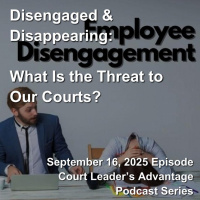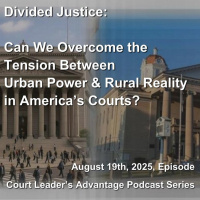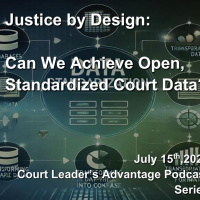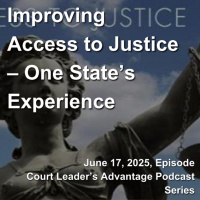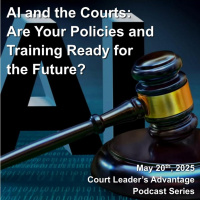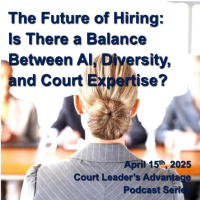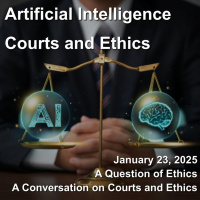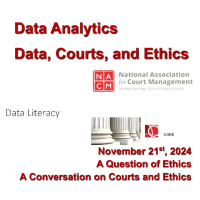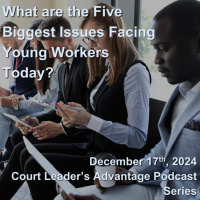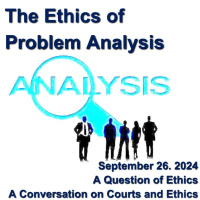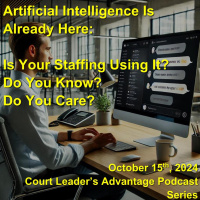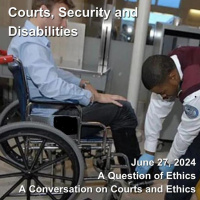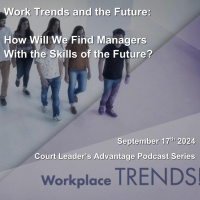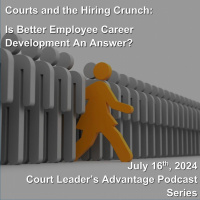Sinopsis
Coming innovations, thought-provoking trends, questions that matter to the court community, these and more themes are covered by the Court Leaders Advantage podcast series, a forum by court professionals for court professionals to share experiences and lessons learned.
Episodios
-
Who Speaks for the Unrepresented? Exploring New Models for Legal Access
18/11/2025 Duración: 34minA Question of Ethics: A Conversation on Courts and EthicsNovember 20th, 2025Across America, many communities are in what scholars call “legal deserts,” areas with few, if any, available attorneys to meet the legal needs of local citizens. Rural towns and poorurban neighborhoods often lack affordable access to lawyers, leaving residents without practical guidance for solving their legal problems. This shortage frustrates individuals seeking justice, and undermines confidence in the justice system itself. It widens the gap between those who can afford representation and those who cannot. To help bridge this gap, a few states (for example, Utah, Alaska, and now Oregon), are experimenting with using non-attorney legal advocates. These are trained professionals, often known as Community Justice Workers, who work under the guidance of a practicing attorney. Others, in Arizona for example, are called Certified Community Legal Advocates. They are untethered from a practicing lawyer. These non-attorney advocates can
-
Unpacking Mentorships What is the Potential? What are the Pitfalls? What is the Path to Growth?
17/11/2025 Duración: 33minCourt Leader’s Advantage Podcast November 18, 2025, EpisodeMentorship isn’t just a nice-to-have, it’s a game-changer. It bridges the gap between experience and ambition, turning goals of “someday” into measurable progress today. A great mentor can:• Share hard-won wisdom and real-world perspective• Help navigate tough choices with clarity and confidence• Accelerate growth by shortening the learning curve• Boost self-assurance and professional presence• Steer a mentee away from common pitfalls before they happen. But mentorship goes far beyond building skills. It helpsprofessionals feel seen, supported, and valued, part of a larger purpose and community. In the workplace, a mentor can decode unwritten rules, clarify expectations, and open doors to meaningful opportunities. For emerging professionals, it’s often the spark that ignites a sense of possibility, revealing paths they never knew existed.Organizations that invest in mentoring don’t just growtalent, they grow loyalty, collaboration, and a culture of c
-
Disengaged and Disappearing: What Is the Threat to Our Courts?
15/09/2025 Duración: 34minSeptember 16th, 2025, Court Leader’s Advantage Podcast EpisodeEmployee disengagement is a critical national issue, one that quietly undermines productivity, economic growth, and workplace culture across the United States. According to a2024 Gallup Corporation report:· Only 33% of Employees are Actively Engaged in Their Work· 50% are Not Engaged They are going through the motions without energy or passion.· 17% are Actively Disengaged. They are, in somecases, sabotaging the efforts of their colleagues. These statistics paint a sobering portrait of a workforce in quiet crisis, where a majority of employees are not fully invested in their work. Gallup estimates the cost ofthis disengagement to the U.S. economy at over $1.9 trillion annually lost in productivity, absenteeism, turnover, and diminished performance. Managers point to employee shortcomings:Failure to Own Their Performance and Growth Many employees stop seeking challenges, feedback, or development. They become content to drift rather
-
Divided Justice: Can We Overcome the Tension Between Urban Power and Rural Reality in America’s Courts
16/08/2025 Duración: 23minAugust 19, 2025, Court Leader’s Advantage Podcast Episode Many contend that tensions between larger general jurisdiction courts and smaller limited jurisdiction courts stem from disparities in resources, staffing, and technology. Urban courts, with their towering caseloads, high-stakes criminal prosecutions, sprawling civil disputes, and complexlitigation, tend to attract greater funding, the best technology, and top-tier legal talent.In contrast, smaller suburban and rural courts, quietly manage everyday justice with limited staff and sometimesoutdated systems. They can find themselves on the margins of statewide judicial planning. Urban courts are often the first to adopt new tools such as AI-assisted litigant self-help, virtual hearings, and real-time language translation. Smaller courts often watch from a distance, struggling with connectivity issues and budget constraints. Is this gap just technological or is it cultural? What works in a bustling city courthouse may falter in a courthouse where everyon
-
Justice by Design: Can We Achieve Open, Standardized Court Data?
13/07/2025 Duración: 32minJuly 15th, 2025, Court Leader’s Advantage Podcast EpisodeOne of the major challenges facing state trial courts today is the disturbing lack of accurate national statistical data. Beneath the surface of our justice system lies a troubling truth: we often don’t know, we can’t know, what’s really happening.How many cases do our courts handle? What kinds? How efficiently? Without reliable data, we are left to make educated guesses in the dark. This absence of clarity is not accidental, it is the result of a decentralized system ofjustice.Some of the results include:Lack of Uniform Court CodingWhat one court calls a “hearing,” another might call a “conference.” These differences seem small, but they add up to a patchwork of mismatched codes, formats, and definitions across jurisdictions.Limited Data Transparency and Public AccessEven when data exists, it is often locked behind arcane systems, hard to find, and harder to interpret.Hurdles with Data SharingDisconnected technologies, legacy systems, and inconsistent
-
Improving Access to Justice – One State’s Experience
16/06/2025 Duración: 32minCourt Leader’s Advantage Podcast Episode June 17, 2025Civil case filings per capita have been declining nationally for decades. John Greacen and Alan Carlson explained this in their book, What Is Happening to State Trial Court Civil Filings? The absolute number of civil filings in state courts has increased somewhat, however overall filings have not kept pace with population growth and have been in a long-term decline. Meanwhile, the National Center for State Courts' annual State of the State Courts poll reported that public trust and confidence in the state courts rose in 2024 to 63%. However, this figure has stagnated between 60% and 64% over the past four years. These troubling numbers raise some important questions: How are people resolving their disputes? How are people now resolving their disputes? Are they, in fact, resolving them at all? One thing is certain: more and more, people are not turning to the courts, the traditional venue for peacefully settling conflict.What can we do about this tren
-
AI in the Courts: Are Your Policies and Training Ready for the Future?
19/05/2025 Duración: 34minCourt Leader’s Advantage Podcast Episode May 20, 2025Artificial Intelligence (AI) is no longer just a futuristic concept, it is already reshaping how we live and work. Courts are no exception. With its immense power, AI is transforming the justice system in ways we could have only imagined a few years ago. Here’s how AI’s power is already making waves:Unmatched Efficiency: AI can produce polished reports, memos, and articles in mere minutes—dramatically reducing the time and effort needed for routine tasks.Instant Access to Information: AI enables litigants,families, and other court users, to engage in meaningful conversations about procedures without relying on human staff.Sharper Decision-Making: AI-driven insights are helping leaders make more informed, data-backed judicial and administrative decisions.Compelling Presentations: AI tools are enhancing professional presentations and transforming complex ideas into easily digestible information for audiences. Yet, with all this potential comes a need for caut
-
The Future of Hiring: Is There a Balance Between AI, Diversity, and Court Expertise?
15/04/2025 Duración: 34minApril 15, 2025, Court Leader’s Advantage Podcast EpisodeEmployee hiring is at a crossroads. With artificial intelligence (AI) revolutionizing the way resumes and applications are screened, employers—including courts—are rethinking how they identify top talent. At the same time, the push for greater diversity means evaluating candidates from vastly different backgrounds using a common set of standards.Courts are grappling with severe staffing shortages, struggling to find candidates who not only have technical expertise but also the interpersonal skills to navigate high-stakes legal and personal matters with litigants and families. With these challenges converging, one question looms large: How do you hire the right candidate in this volatile environment?This month we will explore the dynamic tension between the quest for increased diversity and keeping evaluations unbiased. We will discuss the quest to find a balance at a time when artificial intelligence is potentially changing the very rules for selecting n
-
Artificial Intelligence: Ethics and Courts
02/04/2025 Duración: 41minQuestion of Ethics Conversation: January 23, 2025Artificial intelligence has the potential to reshape the judicial system. AI-powered tools, from legal research assistants to sentencing algorithms and customer service chatbots, offer efficiency but also introduce risks, particularly bias. Additionally, the confidentiality of court records and legal proceedings becomes a pressing concern, as AI systems require vast sums of data for training—potentially exposing sensitive information to breaches or misuse.While AI chatbots improve accessibility by guiding litigants through procedural questions, the possibility of providing incorrect information and the prohibition against providing legal advice highlights the need for careful human oversight.As courts integrate AI into their operations, how do we ensure transparency, accountability, and fairness? What ethical and legal questions arise?Today's Moderator Creadell Webb, Chief Diversity, Equity, and Inclusion Officer for the 1st Judicial District in Philadelphi
-
How Do We Navigate the Tension Between Cities and Municipal Courts?
17/03/2025 Duración: 19minMarch 18, 2025, Court Leader’s Advantage Podcast EpisodeThe relationship between cities and their municipal courts is often marked by underlying tension. While courts must function independently, their close ties to city governments can create friction over revenue, resources, and oversight.Underfunded municipal courts frequently struggle with case backlogs, understaffing, and limited access to justice. Judicial independence and the autonomy of other elected officials, such as the Clerk of Court, can also be at risk when city governments exert influence over judicial appointments, salaries, or case outcomes. This interference undermines the courts' ability to serve as impartial arbiters of the law.This month we will explore the tension between cities and municipal courts. We will also discuss how municipal courts can navigate these challenges.Today’s Panelists• Lizzie Alipaz, Court Clerk and Deputy Town Clerk for the Town of Timnath, Colorado• Lori Tyack, elected Clerk of Court for the Franklin County Municip
-
Trauma-Informed Engagement and the Courts: What We Need to Know Now?
16/02/2025 Duración: 32minFebruary 18, 2025 , Court Leader’s Advantage Podcast EpisodeUnderstanding trauma-informed engagement is increasingly essential for court employees and judges. Many—if not most—individuals who interact with the court system have experienced significant trauma. Whether they are litigants, witnesses, or defendants, they often carry the invisible weight of past or ongoing adversity.A trauma-informed approach helps court professionals recognize signs of trauma and respond in ways that foster trust, reduce stress, and minimize the risk of re-traumatization. Additionally, this approach supports the well-being of court employees by equipping them with strategies to navigate difficult interactions while mitigating the impact of secondary traumatic stress on themselves.This month, we are exploring the role of trauma-informed engagement in court interactions. How can courts further integrate this critical practice to enhance fairness, empathy, and effectiveness in the justice system?Today's Panel: Carrie Summer-Namu
-
Data Analytics: Data, Courts, and Ethics
27/01/2025 Duración: 32minNovember 21st, 2024, Question of Ethics Conversation Copilot describes data literacy as understanding, interpreting, and using data effectively. It involves knowing how to read charts and graphs, understanding statistics, and being able to critically evaluate data sources for their reliability and relevance. Just as how literacy with words helps you comprehend and communicate in language, data literacy empowers you to navigate and make sense of the vast amounts of data we encounter daily. Problem Analysis is an often-overlooked component of decision-making. In this episode we discuss data literacy and how it intersects with ethics in the courts. Episode Moderator: Roger Rand, IT Manager, Multnomah County Circuit Court, Portland, Oregon Episode Panel: Courtney Whiteside, Director, Municipal Court, St. Louis, Missouri. Courtney is also the chair of the NACM Ethics Subcommittee. Stacy Worby, State Jury Coordinator, Alaska State Court System, Anchorage. Ellen Haines, Supervisor, IT Training & Data Analysis D
-
What are the Five Biggest Opportunities Facing Young Workers Today?
18/01/2025 Duración: 35minJanuary 21, 2025, Court Leader’s Advantage Podcast Episode Last month we talked about the five biggest issues facing young workers. This month we will look at the five biggest opportunities young workers have in 2025. The five are: The opportunity to Develop Valuable Digital Skills & Technological Expertise Access to Continuous Learning and Development to expand their knowledge & skills The Chance to Build a Global Network of peers and mentors The ability to excel at Collaboration & Connectivity which enhances team dynamics, and The opportunity to find a career where they Feel Valued & Seen Today’s Moderator: Erika Schmid, Supervisor, Multnomah Circuit Court, Portland Oregon Today’s Panel: Samantha Wallis, Assistant Court Administrator, District Court, Coeur d’Alene, Idaho Daniel Meza Rincón, Deputy Juvenile Court Administrator, Utah Administrative Office of the Courts, Salt Lake City Victoria Murray, Business Intelligence Analyst & Supervisor, Maricopa Superior Court, Phoenix, Arizona
-
What are the Five Biggest Issues Facing Young Workers Today?
15/12/2024 Duración: 36minDecember 17, 2024, Court Leader’s Advantage Podcast Episode This month and in January we’re looking at the 5 biggest issues and the 5 biggest opportunities facing young workers today. This month we will consider the five biggest issues which include: • Work-Life Balance • Job Security • Mental Health and Well-Being • Diversity, Equity, and Inclusion (DEI) • Career Development and Growth Opportunities Moderator Erika Schmid Supervisor, Multnomah Circuit Court, Portland, Oregon Today’s Panel Samantha Wallis Assistant Court Administrator, District Court, Coeur d’Alene, Idaho Daniel Meza Rincón Deputy Juvenile Court Administrator, State of Utah, Salt Lake City, Utah Victoria Murray Business Intelligence Analyst & Supervisor, Maricopa Superior Court, Phoenix, Arizona. Carrie Summers-Nomura Program Coordinator, Clackamas County Circuit Court, Oregon City, Oregon Courtney Whiteside Director, Municipal Court, St. Louis, Missouri Leave a question or comment about the episode at clapodcast@nacmnet.org
-
Ethics and Problem Analysis
02/12/2024 Duración: 20minSeptember 26, 2024, Question of Ethics Conversation Problem Analysis is an often-overlooked component of decision-making. There are several highly effective business problem analysis models, each tailored for different types of challenges. Some of the most popular models: • Root Cause Analysis which includes techniques such as “The Five Whys” and the “Ishikawa Fishbone Diagram” • SWOT Analysis (Strengths, Weaknesses, Opportunities, Threats) • Gap Analysis which includes identifying gaps between where an organization is and where it needs to be, then focusing on areas of improvement. There are several ethical concerns when conducting good problem identification and analysis. • What if you cannot obtain the political buy-in needed to properly analyze the problem? • How do you properly identify and analyze a business problem with a strong political undercurrent? • How do you proceed if a solution is already laid out for you? • When we become operationally aligned with a decision-maker do we run the risk of “pre
-
Artificial Intelligence Is Already Here: Is Your Staffing Using It? Do You Know? Do You Care?
14/10/2024 Duración: 36minOctober 15, 2024, Court Leader’s Advantage Podcast Episode Forbes Magazine recently published an article titled “10 Biggest Business Trends Everyone Must Be Ready For Now.” The list? 1. Generative Artificial Intelligence Will Be Everywhere. 2. Demand for Interpersonal Skills 3. The Move to Sustainable Business 4. Business Resilience 5. Personalization of the Customer Experience at Scale 6. A Customer Experience Revolution 7. The Data Economy 8. The Search for Skills Solutions 9. Employees Demand Remote Work opportunities 10. The Shift to Diversity and Inclusivity Many court administrators appear to see artificial intelligence as an IT issue. However, it is definitely a consumer-based concept now. A short time ago, the venture capital firm Andreessen Horowitz announced its top 100 consumer AI apps. The most popular one by far? ChatGPT, trailed by other tools including Microsoft CoPilot, Google’s Gemini and Bing, Character AI, Perplexity, Claude, and even Grammarly. These tools can create compelling text in
-
Courts, Security, and Disabilities
25/09/2024 Duración: 38minJune 27, 2024, A Question of Ethics Conversation Robert Granzow, Director of the Office of Judicial District Security at the Pennsylvania Supreme Court’s Administrative Office of Pennsylvania Courts, talks about safety, security, and dealing with disabilities in the court environment. Equal access to justice can only be realized in an environment of safety and security. We must ensure the safety of those with and those without disabilities. Disabilities can include, physical, traumatic, psychological, mental illness, congenital birth defects, personality disorders, addictive disabilities, as well as cultural and language differences. We live in a rapidly changing threat landscape. Courts all stakeholders at the table and need to conduct a comprehensive security assessment, preferably using a gap analysis. Courts must have political buy-in from the highest level. We need to make data-driven decisions. Solutions include training in de-escalation and non-escalation; recognizing the signs of people in crisis; u
-
Work Trends and the Future: How Will We Find Managers With the Skills of the Future?
16/09/2024 Duración: 33minSeptember 17th, 2024 Court Leader’s Advantage Podcast Episode The world-renowned technology advisory firm, The Gartner Group, has come out with its Nine Future Work Trends for 2024. These are trends that Gartner has said will reshape the future of work. They are driven by the need to attract and retain top talent, reduce operational costs, and enhance productivity. The trends are: · Skills Will Become More Important than Degrees and Certificates in Recruitment and Selection · Career Stereotypes Will Collapse in the Face of a Changing Workforce · Employee Conflict Resolution will be the Next “Must Have” Management Skill · The “Cost of Work” Crisis Will Reach a Breaking Point as employees calculate the cost of traveling every day to and from a brick & mortar courthouse · The Four-Day Workweek Becomes Routine · We will stop talking about DEI. It just becomes the Way We Work · Generative Artificial Intelligence Experiments Will Likely Yield Hard Lessons & Painful Costs. These experiments will emphasi
-
NACM in New Orleans 2024: What Was Your Biggest Takeaway?
18/08/2024 Duración: 22minAugust 20th 2024 Court Leader’s Advantage Podcast Episode The 2024 NACM annual conference brought together court professionals from across the country to share best practices, address common challenges, and discover innovative solutions. Titled Leadership Opportunities & Challenges for Our Nation’s Courts: Leading Leaders into the New Tomorrow, it convened a dynamic mix of professionals, including many emerging voices in the field, who are passionate about the future of our judicial system. From discussions on the latest technological advancements like AI to strategies for enhancing access to justice, the conference provided a rich platform for learning and collaboration. This month we are asking young court professionals the question, “What was your biggest takeaway from this year’s NACM Conference?” You will hear directly from young attendees about valuable insights, practical tools, and inspiring connections. Whether you are a seasoned administrator or just starting on your career, this episode wil
-
Courts & the Hiring Crunch: Is Better Employee Career Development An Answer?
15/07/2024 Duración: 38minJuly 16th, 2024, Court Leader’s Advantage Podcast Episode In previous podcasts, we have discussed the unprecedented hiring crunch facing our country. Intensified by the COVID-19 pandemic, it has been characterized by a significant mismatch between the supply of, and demand for young talent. Despite robust economic recovery efforts, employers in general and courts in particular are struggling to fill empty desks. All the while, jobseekers are running up against barriers that make traditional careers less attractive. Throughout this challenge, a question badgers many employers: What do young job applicants want? Panelists on previous episodes have suggested a lack of flexible scheduling, hybrid work options, and career advancement opportunities as reasons job seekers go elsewhere. Are these the factors now driving job candidates or does it just come down to money? This month we will take a deeper dive into how courts are scrambling to recruit and retain skilled employees. Questions we will explore incl



